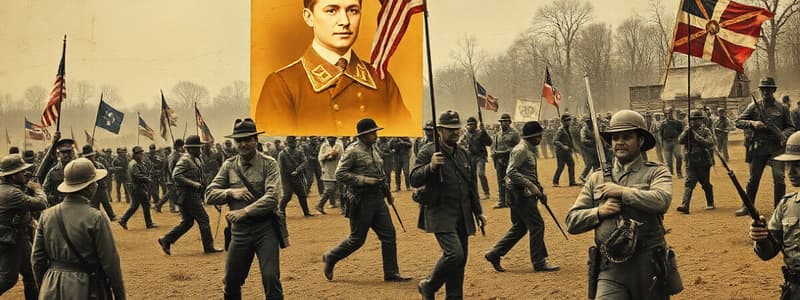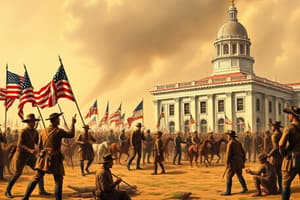Podcast
Questions and Answers
What was the main reason for the South to secede from the Union?
What was the main reason for the South to secede from the Union?
- Fear of a powerful federal government.
- Political differences with the North.
- A belief in states' rights and the protection of slavery. (correct)
- Disagreements over economic policies.
Which of the following resources did the South have a significant advantage in during the Civil War?
Which of the following resources did the South have a significant advantage in during the Civil War?
- Food crops
- Factories
- Railroad Tracks
- Skilled soldiers (correct)
The Union's Anaconda Plan aimed to blockade Southern ports and strategically capture key Southern cities.
The Union's Anaconda Plan aimed to blockade Southern ports and strategically capture key Southern cities.
True (A)
What was the goal of the Anaconda Plan as it was applied to the Confederacy?
What was the goal of the Anaconda Plan as it was applied to the Confederacy?
Describe the significance of Fort Sumter in the Civil War.
Describe the significance of Fort Sumter in the Civil War.
What important effect did the Battle of Antietam have on the course of the Civil War?
What important effect did the Battle of Antietam have on the course of the Civil War?
What was the purpose of the Emancipation Proclamation?
What was the purpose of the Emancipation Proclamation?
Why was the Battle of Gettysburg considered a turning point in the Civil War?
Why was the Battle of Gettysburg considered a turning point in the Civil War?
What was Sherman's 'March to the Sea' and what was its objective?
What was Sherman's 'March to the Sea' and what was its objective?
What were the main reasons for the Confederacy's defeat in the Civil War?
What were the main reasons for the Confederacy's defeat in the Civil War?
Flashcards
What are the resources needed to fight a war?
What are the resources needed to fight a war?
The resources a nation needs to wage war successfully - including soldiers, money, supplies, and methods of transportation.
Who were the Yankees?
Who were the Yankees?
The Union, or North, in the American Civil War.
Who were the Rebels?
Who were the Rebels?
The Confederacy, or South, in the American Civil War.
What was the Confederate States of America?
What was the Confederate States of America?
Signup and view all the flashcards
What was Lincoln's primary objective?
What was Lincoln's primary objective?
Signup and view all the flashcards
What marked the start of the Civil War?
What marked the start of the Civil War?
Signup and view all the flashcards
What was Fort Sumter?
What was Fort Sumter?
Signup and view all the flashcards
What was the Anaconda Plan?
What was the Anaconda Plan?
Signup and view all the flashcards
What is a blockade?
What is a blockade?
Signup and view all the flashcards
How did the Union blockade affect Georgia?
How did the Union blockade affect Georgia?
Signup and view all the flashcards
What was the Battle of Antietam?
What was the Battle of Antietam?
Signup and view all the flashcards
What was the Emancipation Proclamation?
What was the Emancipation Proclamation?
Signup and view all the flashcards
How did slavery end in the United States?
How did slavery end in the United States?
Signup and view all the flashcards
How did Southerners react to the Emancipation Proclamation?
How did Southerners react to the Emancipation Proclamation?
Signup and view all the flashcards
How did the Emancipation Proclamation change the North's motives?
How did the Emancipation Proclamation change the North's motives?
Signup and view all the flashcards
How did the Emancipation Proclamation change the war for African Americans?
How did the Emancipation Proclamation change the war for African Americans?
Signup and view all the flashcards
How many African Americans fought for the Union?
How many African Americans fought for the Union?
Signup and view all the flashcards
What was the Battle of Gettysburg?
What was the Battle of Gettysburg?
Signup and view all the flashcards
Why was capturing Atlanta crucial for the Union?
Why was capturing Atlanta crucial for the Union?
Signup and view all the flashcards
What was the Battle of Chickamauga?
What was the Battle of Chickamauga?
Signup and view all the flashcards
Who was General William Tecumseh Sherman?
Who was General William Tecumseh Sherman?
Signup and view all the flashcards
What was the Atlanta Campaign?
What was the Atlanta Campaign?
Signup and view all the flashcards
What was th
What was th
Signup and view all the flashcards
What were some key battles of the Atlanta Campaign?
What were some key battles of the Atlanta Campaign?
Signup and view all the flashcards
What was Sherman's 'March to the Sea'?
What was Sherman's 'March to the Sea'?
Signup and view all the flashcards
What was the battle of Griswold?
What was the battle of Griswold?
Signup and view all the flashcards
What was the significance of Savannah in the Civil War?
What was the significance of Savannah in the Civil War?
Signup and view all the flashcards
What was Andersonville Prison?
What was Andersonville Prison?
Signup and view all the flashcards
What were the conditions inside Andersonville Prison?
What were the conditions inside Andersonville Prison?
Signup and view all the flashcards
Who was Major Henry Wirz?
Who was Major Henry Wirz?
Signup and view all the flashcards
How did the Civil War end?
How did the Civil War end?
Signup and view all the flashcards
Study Notes
Georgia's Role in the Civil War
- Georgia played a significant role in the Civil War, experiencing numerous battles and campaigns.
- The state's strategic importance, particularly its railway lines and ports, made it a target for Union forces.
- Major battles fought in Georgia included Chickamauga, Atlanta Campaign, and the March to the Sea.
- Confederate General Robert E. Lee led troops against Union forces in the state.
- The war significantly impacted Georgia's economy and infrastructure.
Economic and Historical Context of the Civil War
- Both sides needed resources like soldiers, money, supplies, food, weapons, clothes, boots, and transportation.
- The North had a larger population and stronger economy, with more bank deposits, factories, food crops, horses, donkeys and mules, and railroad tracks compared to the South.
- These factors influenced which side was expected to win the war, however, at the start of the war the Confederacy had greater determination and skilled leaders.
Comparing the Union and the Confederacy
- The Union (North) had a greater population, stronger economy, powerful navy, and better transportation.
- The Confederacy (South) had better military training, a greater number of skilled military leaders (many with experience from the Mexican War), and greater fighting to defend their land and way of life.
- Both sides had different advantages impacting the course of the war.
The Civil War
- The Civil war started in 1861, when seven Southern states seceded and formed the Confederacy.
- Abraham Lincoln was against the spread of slavery and Southerners feared this threat to their livelihood.
- The Union's goal was to "preserve the Union," and asked Southern states to rejoin.
- The war officially began in April 1861, after Confederate troops attacked Fort Sumter.
- Fort Sumter was a Union fort protecting the harbor of Charleston, South Carolina. Union forces inside the fort ran low on supplies, and surrendered.
Blockade
- The Union established a blockade of Southern ports in response to Confederate commerce.
- The blockade was aimed at weakening the South's economy by hindering trade.
- General Winfield Scott's "Anaconda Plan" aimed to "squeeze" the Confederacy to death by cutting off supplies and weakening their trade.
- The Confederacy relied on exporting cotton and importing supplies, the blockade was intended to halt this trade.
Anaconda Plan
- The Anaconda Plan was a strategy employed by the Union during the Civil War.
- This plan involved strangling the Confederacy by blockading Southern ports and controlling the Mississippi River.
- The plan aimed to cut off Confederate supplies and weaken their economy.
- The plan involved the Union army and navy working together to achieve its goals.
Fort Sumter
- Located in the harbor of Charleston, South Carolina, Fort Sumter was a key strategic location.
- The Union forces inside the fort surrendered due to low supplies.
- Nobody was killed directly during the battle itself, however, one person died during a salute to the flag.
Whitworth Rifles
- Whitworth rifles were used by the Confederacy in the defense of Charleston.
Gettysburg
- The Battle of Gettysburg was a turning point in the Civil War, fought in Pennsylvania.
- Confederate General Robert E. Lee hoped to win this battle and convince the Union to give up, however, the Union's victory significantly hampered Lee's aspirations.
The Union and Confederate Leaders
- President Abraham Lincoln led the Union.
- President Jefferson Davis led the Confederacy.
- Other military leaders included Ulysses S. Grant, William Tecumseh Sherman, Robert E. Lee.
Atlanta Campaign
- General William Tecumseh Sherman and his Union Army moved towards Atlanta to dismantle the Confederate industrial and railway center.
- The goal was to capture and destroy Atlanta, as it was a crucial hub for the Confederacy.
- Many battles occurred along the way towards Atlanta with major conflicts including battles around Atlanta including Peachtree Creek and Ezra Creek, as well as capturing Atlanta itself.
- Atlanta was destroyed and its factories and railroads were damaged by Union forces.
- This marked the beginning of the end of the Confederate War.
March to the Sea
- Sherman split his army and continued on to Savannah.
- Sherman instructed his soldiers to destroy any towns, plantations, and railroads along the way.
- This action aimed at crushing any remaining Confederate fighting spirit.
- The March to the Sea significantly damaged the South's infrastructure and morale.
Andersonville Prison Camp
- The Confederate prison, located in Andersonville, Georgia, was notorious for its inhumane conditions.
- It held over 30,000 prisoners during the war.
- Overcrowding, lack of resources, sanitation, and disease led to the deaths of many soldiers held as prisoners of war.
- Major Henry Wirz, the commander of the prison, was executed after the war.
The Civil War Ends
- The Confederacy gradually wore down amidst the lack of supplies and troops, fighting in Virginia, however, the war ended when General Lee surrendered to General Grant.
- The end of the Civil War is marked by General Lee's surrender to General Grant.
- The conflict claimed approximately 620,000-850,000 lives.
Studying That Suits You
Use AI to generate personalized quizzes and flashcards to suit your learning preferences.




